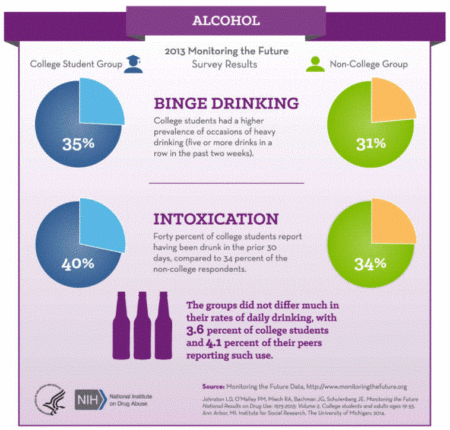What is Alcohol Use Disorder (AUD)?
Alcohol is a major contributor to global disease and a leading cause of preventable death, causing approximately 95,000 deaths annually in the United States alone, including 1 in 10 total deaths among working-age adults. This is according to the Center for Disease Control and Prevention (CDC) [1]. In addition, alcohol use disorder (AUD) is one of the most common psychiatric or mental disorders, with almost one-third of U.S. adults experiencing alcohol use disorder at some point during their lives.
For most American adults, moderate alcohol use is probably not harmful. However, about 18 million adults in the U.S .have an alcohol use disorder (AUD). This is according to the National Institute of Health (NIH) [2]. This means that their drinking alcohol causes distress and harm. Alcohol use disorder can range from mild to severe, depending on the symptoms. Severe AUD is sometimes called alcoholism or alcohol dependence. Symptoms of alcohol use disorder can be unpleasant and even dangerous.

Get Your Life Back
Find Hope & Recovery. Get Safe Comfortable Detox, Addiction Rehab & Mental Health Dual Diagnosis High-Quality Care at the We Level Up Treatment Centers Network.
Hotline (877) 378-4154Is Alcohol Use Disorder a Disease?
Alcohol use disorder is a medical condition. It’s a disease of brain function and needs psychological and medical treatments to control it. Alcohol use disorder can be mild, moderate, or severe. It can advance quickly or over a long period of time. Knowing the signs and symptoms of alcohol use disorder can aid you or your loved one is seeking help before the problem turns into dependence and addiction. According to the National Institue of Health, alcohol use disorder is a disease that causes:
- Craving: It is a strong need to drink
- Loss of Control: Not being able to quit drinking once you’ve started
- Negative Emotional State: Feeling irritable and anxious when you are not drinking

Alcohol Use Disorder – A Comparison Between DSM-IV and DSM-5
According to the Substance Abuse and Mental Health Service Administration (SAMSHA) [3], in May 2013, the American Psychiatric Association (APA) issued the 5th edition of the Diagnostic and Statistical Manual of Mental Disorders (DSM-5). Although there is considerable overlap between DSM-5 and DSM-IV, the prior edition, there are several important differences DSM–IV described two distinct disorders, alcohol abuse, and alcohol dependence, with specific criteria for each.
DSM-5 integrates the two DSM-IV disorders, alcohol dependence and alcohol abuse, into a single disorder called alcohol use disorder (AUD) with mild, moderate, and severe subclassifications. Under DSM-5, anyone meeting any two of the eleven criteria during the same twelve-month period would receive a diagnosis of alcohol use disorder (AUD). The severity of an alcohol use disorder— mild, moderate, or severe—is based on the number of criteria met:
- Mild: It is the presence of 2 to 3 symptoms of alcohol use disorder
- Moderate: It is the presence of 4 to 5 symptoms of alcohol use disorder
- Severe: It is the presence of 6 or more symptoms of alcohol use disorder
The DSM-5 excludes legal problems as a criterion, adds craving as a criterion for an alcohol use disorder (AUD )diagnosis, and modifies some of the criteria descriptions with updated language.
Get Help. Get Better. Get Your Life Back.
Searching for Accredited Drug & Alcohol Rehab Centers Near You? Or Mental Health Support?
Even if you have failed previously, relapsed, or are in a difficult crisis, we stand ready to support you. Our trusted behavioral health specialists will not give up on you. Call us when you feel ready or want someone to speak to about therapy alternatives to change your life. Even if we cannot assist you, we will lead you wherever you can get support. There is no obligation. Call our hotline today.
FREE Addiction Hotline – Call 24/7What Causes Alcohol Use Disorder?
Experts are still trying to find and understand what causes alcohol use disorder. It appears to be a combination of one or more of the following:
- Genetics
- Early childhood events
- Attempts to relieve emotional pain
- People are more likely to become an alcoholic if they:
- Consume alcohol often, or starts early in life
- Experienced trauma, such as sexual or physical absue

What is Binge Drinking?
Binge drinking is drinking so much alcohol at once that the blood alcohol concentration (BAC) level is 0.08% or more. For a man, this usually happens after having five or more drinks within a few hours. For a woman, it is after about four or more drinks within a few hours. Not everyone who binges drinks has an alcohol use disorder, but they are at higher risk for getting one.
According to CDC [4], one in six adults in the US binge drinks about four times a month, consuming about seven drinks per binge. This results in 17 billion total binge drinks consumed by adults annually, or 467 binge drinks per binge drinker.
How to Prevent Binge Drinking?
Practice these steps to lower your risk while drinking:
- Check and limit how much you have at one time. If you drink, experts recommend an average of no more than one drink per day for women and two for men.
- Drink more slowly
- Have some food while you drink
- Alternate alcoholic drinks with nonalcoholic ones. Water is best
- Develop a plan. Drink with people you trust, and know how you’ll get home safely
What are the Dangers of Too Much Alcohol?
Too much alcohol is bad and dangerous. Heavy drinking can increase the risk of certain cancers. It may lead to liver diseases, such as fatty liver disease, hepatitis, and cirrhosis of the liver. Heavy drinking can also cause damage to the brain and other organs. Drinking during pregnancy can harm your baby. Substance like alcohol also increases the risk of death from car crashes, injuries, suicide, and homicide.
Comfortable Facilities & Amenities
High-Quality Addiction & Mental Health Rehabilitation Treatment
Rehab Centers TourRenowned Addiction Centers. Serene Private Facilities. Inpatient rehab programs vary.
Addiction Helpline (877) 378-4154Proven recovery success experience, backed by a Team w/ History of:
15+
Years of Unified Experience
100s
5-Star Reviews Across Our Centers
10K
Recovery Success Stories Across Our Network
- Low Patient to Therapist Ratio
- Onsite Medical Detox Center
- Comprehensive Dual-Diagnosis Treatment
- Complimentary Family & Alumni Programs
- Coaching, Recovery & Personal Development Events
Symptoms of Alcohol Use Disorder Stages & Descriptions
Alcohol use that turns into an alcohol use disorder develops in stages.
At-Risk Stage
- This is when a person drinks socially or drinks just to relieve stress or to feel better. A person may start to develop a tolerance for alcohol.
Early Alcohol Use Disorder
- In this stage, the person has progressed to drinking alone or in secret, blackouts, and thinking about drikng alcohol a lot.
Mid-Stage Alcohol Use Disorder
- Alcohol use is now out of control and causes difficulties and problems with daily life (family, work, financial, mental, and physical health). Organ damage (particularly the liver) can be seen on lab tests and scans.
End-Stage Alcohol Use Disorder
- Drinking is now the main focus of life, to the exclusion of food, health, intimacy, and happiness. Desperation, complications of organ damage, and death are now approaching.
What are the Symptoms of Alcohol Use Disorder (AUD)?
Having even a few symptoms, which might not be a sign of trouble, can signal a drinking problem. It certainly helps to know the signs and symptoms of alcohol use disorder so as to make a change early. Doctors diagnose alcohol use disorder when a person has two or more of the symptoms listed below. Alcohol use disorder can be mild if there is a presence of two to three alcohol use disorder symptoms. Moderate means the presence of four to five alcohol use disorder symptoms. Severe indicates the presence of six or more alcohol use disorder symptoms.
Check if you recognize any of these symptoms—or others, such as dysphoria, feeling low, or malaise—in yourself. But don’t worry, even if you have symptoms of an alcohol use disorder, you can take steps to reduce your risks.
In the past year, have you:
- Had times when you ended up drinking more, or longer, than you intended?
- More than once wanted to cut down or stop drinking, or tried to, but couldn’t?
- Spent a lot of time drinking, or being sick from drinking or getting over other aftereffects?
- Wanted a drink so badly you couldn’t think of anything else?
Found that drinking—or being sick from drinking—often interfered with taking care of your home or family? Or caused job troubles? Or school problems? - Continued to drink even though it was causing trouble with your family or friends?
- Given up or cut back on activities that were important or interesting to you, or gave you pleasure, in order to drink?
- More than once gotten into situations while or after drinking that increased your chances of getting hurt (such as driving, swimming, using machinery, walking in a dangerous area, or engaging in unsafe sexual behavior)?
- Continued to drink even though it was making you feel depressed or anxious or adding to another health problem? Or after having had an alcohol-related memory blackout?
- Had to drink much more than you once did to get the effect you want? Or found that your usual number of drinks had much less effect than before?
- Found that when the effects of alcohol were wearing off, you had withdrawal symptoms, such as trouble sleeping, shakiness, restlessness, nausea, sweating, a racing heart, dysphoria (feeling uneasy or unhappy), malaise (general sense of being unwell), feeling low, or a seizure? Or sensed things that were not there?
World-class, Accredited, 5-Star Reviewed, Effective Addiction & Mental Health Programs. Complete Behavioral Health Inpatient Rehab, Detox plus Co-occuring Disorders Therapy.
CALL (877) 378-4154End the Addiction Pain. End the Emotional Rollercoaster. Get Your Life Back. Start Drug, Alcohol & Dual Diagnosis Mental Health Treatment Now. Get Free No-obligation Guidance by Substance Abuse Specialists Who Understand Addiction & Mental Health Recovery & Know How to Help.
Finding the Next Level of Treatment for the Symptoms of Alcohol Use Disorder
If you or your loved one is showing symptoms of alcohol use disorder, it is important that you seek support from your doctor or mental health professional. It’s never too late to reach out for help if you are trying to cope with alcohol or any other substance use disorder.
There are many effective alcohol treatments centers with programs, including ongoing individual therapy, group therapy, prescribed medications, or a combination of these methods [5].
If you or someone you love is struggling with any symptoms of alcohol use disorder, get them the safest help they need and deserve. Our team at We Level Up NJ specializes in creating an ideal environment and providing effective therapies.

Experience Transformative Recovery at the We Level Up Treatment Center.
See our authentic success stories. Get inspired. Get the help you deserve.



Start a New Life
Begin with a free call to an addiction & behavioral health treatment advisor. Learn more about our dual-diagnosis programs. The We Level Up treatment center network delivers various recovery programs at each treatment facility. Call to learn more.
- Personalized Care
- Caring Accountable Staff
- Comfortable Amenities
- Licensed & Accredited
- Renowned w/ 5-Star Reviews